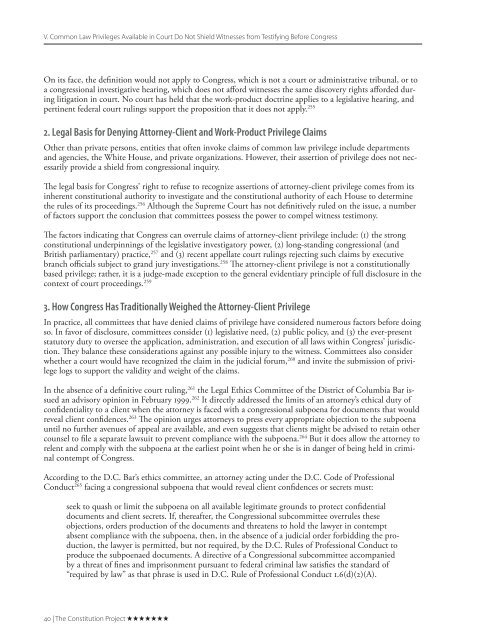When Congress Comes Calling
WhenCongressComesCalling
WhenCongressComesCalling
Create successful ePaper yourself
Turn your PDF publications into a flip-book with our unique Google optimized e-Paper software.
V. Common Law Privileges Available in Court Do Not Shield Witnesses from Testifying Before <strong>Congress</strong><br />
On its face, the definition would not apply to <strong>Congress</strong>, which is not a court or administrative tribunal, or to<br />
a congressional investigative hearing, which does not afford witnesses the same discovery rights afforded during<br />
litigation in court. No court has held that the work-product doctrine applies to a legislative hearing, and<br />
pertinent federal court rulings support the proposition that it does not apply. 255<br />
2. Legal Basis for Denying Attorney-Client and Work-Product Privilege Claims<br />
Other than private persons, entities that often invoke claims of common law privilege include departments<br />
and agencies, the White House, and private organizations. However, their assertion of privilege does not necessarily<br />
provide a shield from congressional inquiry.<br />
The legal basis for <strong>Congress</strong>’ right to refuse to recognize assertions of attorney-client privilege comes from its<br />
inherent constitutional authority to investigate and the constitutional authority of each House to determine<br />
the rules of its proceedings. 256 Although the Supreme Court has not definitively ruled on the issue, a number<br />
of factors support the conclusion that committees possess the power to compel witness testimony.<br />
The factors indicating that <strong>Congress</strong> can overrule claims of attorney-client privilege include: (1) the strong<br />
constitutional underpinnings of the legislative investigatory power, (2) long-standing congressional (and<br />
British parliamentary) practice, 257 and (3) recent appellate court rulings rejecting such claims by executive<br />
branch officials subject to grand jury investigations. 258 The attorney-client privilege is not a constitutionally<br />
based privilege; rather, it is a judge-made exception to the general evidentiary principle of full disclosure in the<br />
context of court proceedings. 259<br />
3. How <strong>Congress</strong> Has Traditionally Weighed the Attorney-Client Privilege<br />
In practice, all committees that have denied claims of privilege have considered numerous factors before doing<br />
so. In favor of disclosure, committees consider (1) legislative need, (2) public policy, and (3) the ever-present<br />
statutory duty to oversee the application, administration, and execution of all laws within <strong>Congress</strong>’ jurisdiction.<br />
They balance these considerations against any possible injury to the witness. Committees also consider<br />
whether a court would have recognized the claim in the judicial forum, 260 and invite the submission of privilege<br />
logs to support the validity and weight of the claims.<br />
In the absence of a definitive court ruling, 261 the Legal Ethics Committee of the District of Columbia Bar issued<br />
an advisory opinion in February 1999. 262 It directly addressed the limits of an attorney’s ethical duty of<br />
confidentiality to a client when the attorney is faced with a congressional subpoena for documents that would<br />
reveal client confidences. 263 The opinion urges attorneys to press every appropriate objection to the subpoena<br />
until no further avenues of appeal are available, and even suggests that clients might be advised to retain other<br />
counsel to file a separate lawsuit to prevent compliance with the subpoena. 264 But it does allow the attorney to<br />
relent and comply with the subpoena at the earliest point when he or she is in danger of being held in criminal<br />
contempt of <strong>Congress</strong>.<br />
According to the D.C. Bar’s ethics committee, an attorney acting under the D.C. Code of Professional<br />
Conduct 265 facing a congressional subpoena that would reveal client confidences or secrets must:<br />
seek to quash or limit the subpoena on all available legitimate grounds to protect confidential<br />
documents and client secrets. If, thereafter, the <strong>Congress</strong>ional subcommittee overrules these<br />
objections, orders production of the documents and threatens to hold the lawyer in contempt<br />
absent compliance with the subpoena, then, in the absence of a judicial order forbidding the production,<br />
the lawyer is permitted, but not required, by the D.C. Rules of Professional Conduct to<br />
produce the subpoenaed documents. A directive of a <strong>Congress</strong>ional subcommittee accompanied<br />
by a threat of fines and imprisonment pursuant to federal criminal law satisfies the standard of<br />
“required by law” as that phrase is used in D.C. Rule of Professional Conduct 1.6(d)(2)(A).<br />
40 | The Constitution Project


